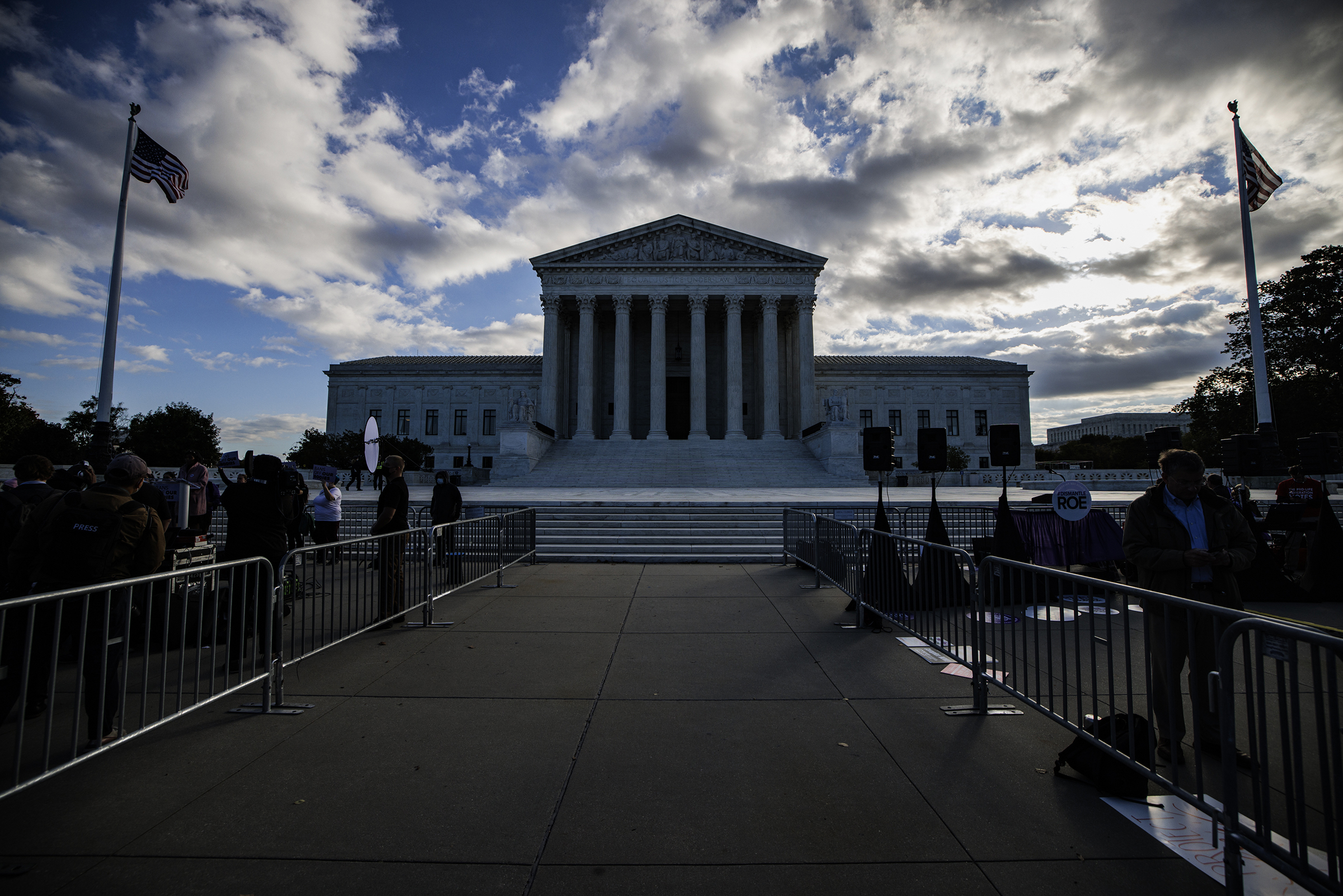
Just 10 days ago, the Supreme Court decided to fast-track its consideration of Texas’s unprecedented abortion law, SB8, which bans most abortions in Texas after six weeks, and gives private citizens the power to enforce that ban through civil lawsuits accompanied by the prospect of sizable damages.
The Supreme Court rarely allows a case to leapfrog the intermediate appeals court, but it did that here in two SB8 cases, one brought by a group of Texas clinics, and one by the Department of Justice. The Court requested briefs in a matter of days and rearranged its November calendar to accommodate the arguments. The decision to expedite the proceedings so dramatically may well have been a response to the public blowback to the Court’s initial handling of SB8. After the Court first silently allowed the law to go into effect, then issued a hasty one-paragraph explanation that cited “complex and novel antecedent procedural questions” preventing it from blocking the law, the Court was widely criticized for its inconsistent treatment of the request for emergency relief in this case and its willingness to grant such relief in other cases, including those involving religious-liberty challenges to certain COVID-19 restrictions.
This morning, the Court heard close to three hours of arguments about whether these cases can proceed—and more fundamentally whether Texas (and potentially other states) can outsource a ban on engaging in constitutionally protected conduct and at the same time cut off judicial review of that ban.
Read more: Inside The Small Group of Doctors Who Risked Everything to Provide Abortions in Texas
The arguments suggested that Texas’s gambit is unlikely to succeed. Even some of the Court’s conservative justices seemed troubled by what a ruling for Texas would mean for core principles of our constitutional structure—that where there’s a right there must be access to some sort of remedy; that states cannot box federal courts out of reviewing plainly unconstitutional state laws in the way Texas has done. Indeed, a number of questions from the conservative side of the bench drew on important civil-rights precedents making just these points. Justice Brett Kavanaugh invoked Shelly v. Kraemer, in which the Court held that a state court’s enforcement of a racially restrictive housing covenant was “state action” for constitutional purposes, even though the covenant itself was a private agreement. Chief Justice John Roberts returned several times to Terry v. Adams, in which the Court held that Texas could not evade a constitutional prohibition on racially discriminatory primary elections by outsourcing its primaries to a private political organization.
A number of justices also seemed concerned that siding with Texas would mean that no constitutional right is safe—that state lawmakers could use this template to effectively ban the exercise of disfavored constitutional rights. Chief Justice Roberts asked whether a state could create a similar system involving a bounty of $1 million dollars, rather than $10,000 (Texas suggested yes). Justice Kagan suggested that each state could single out specific constitutional rights for this treatment—whether that’s “guns, same sex marriage, [or] religious rights.”
This is a dystopic vision, and it will likely be enough to cause a majority of the justices to allow at least one, perhaps both, of the lawsuits to proceed.
Read more: The Fate of Roe v. Wade May Rest on This Woman’s Shoulders
But if Texas loses here, it will be important to avoid falling into the trap of romanticizing either the Court or its rights-protecting role in our constitutional scheme. A decision to side with the challengers here may just mean that Texas overreached in the transparently cynical design of its law. It may also mean that the Court remains invested in protecting its own role as the final arbiter of constitutional meaning, and that this Texas law threatened that. But it should not serve to blunt criticism of the Court, or to undermine the push for Court reform.
And even if the Court does restore abortion access in Texas, that restoration may be short-lived: one month from now, the Court will hear a Mississippi abortion case that could well mean the end of Roe, at least functionally, by June. And, as the Court’s decision to fast-track this case reveals, the Court seems to be paying attention to public reaction. Broad public support for the Court if it rules against Texas here could have the perverse effect of emboldening the Court to proceed more aggressively in the Mississippi case, perhaps overturning Roe outright. That’s both because the decision here could be used as cover in the Mississippi case, and because a Court secure in its public stature may be less concerned about issuing controversial decisions.
Read More: What We Fear in the Wake of the Texas Abortion Law
Still, a clear statement from the Supreme Court that shuts down lawmaking of this sort would be an important development. There is, of course, never a clear line demarcating the worlds of law and politics, but the proliferation of laws like this one would mark a dangerous move toward pressing institutions of justice into the service of partisan projects. For better or worse, courts in our system have been the venues for raising important rights claims of various sorts; Texas’s design turns that on its head, turning courts into forums for harassing individuals for their role the exercise of constitutional rights. That’s a future no one should want.
More Must-Reads from TIME
- How Donald Trump Won
- The Best Inventions of 2024
- Why Sleep Is the Key to Living Longer
- Robert Zemeckis Just Wants to Move You
- How to Break 8 Toxic Communication Habits
- Nicola Coughlan Bet on Herself—And Won
- Why Vinegar Is So Good for You
- Meet TIME's Newest Class of Next Generation Leaders
Contact us at letters@time.com